 |
Index
|
Index
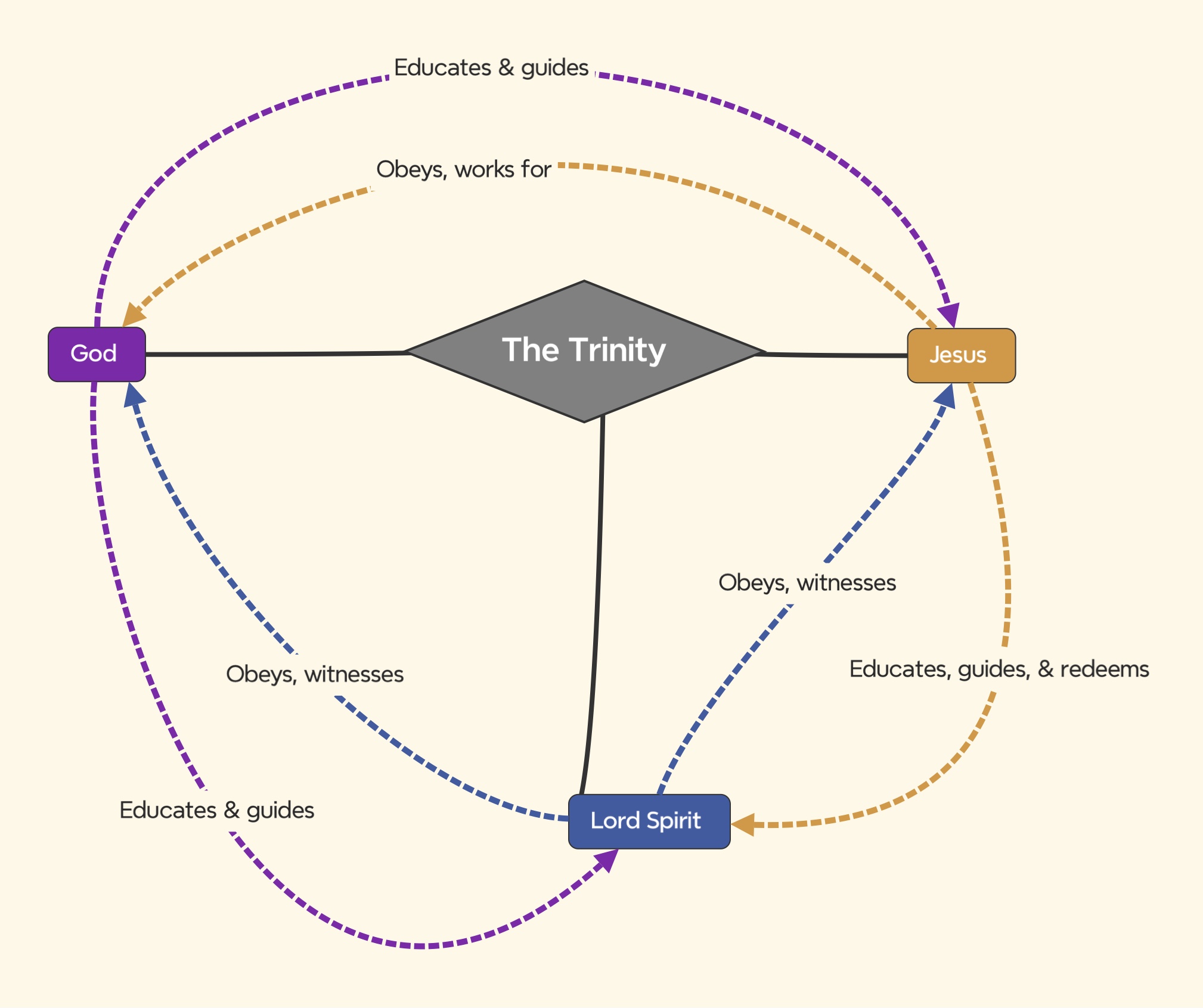
Figure 1: The Trinity - consideration.
whoever says something against the Holy Spirit
will not be forgiven - now or ever.
Matthew 12:32b GNT
In fig.1, God, Jesus, and Spirit are separate entities. The diamond shape, labelled 'The Trinity', is a ternary relationship between the entities. The Trinity - Father, Son, and Spirit - are parties in the Trinity Contract. Fig.1 shows the consideration which exists between the parties of the contract.
A BBC revision course asks, ‘What is meant by the Trinity?’ And the correct answer given is: 'One God existing as three parts.’ The doctrine is illustrated with a diagram rich in contradictions, contraries, and faulty relationship modelling:
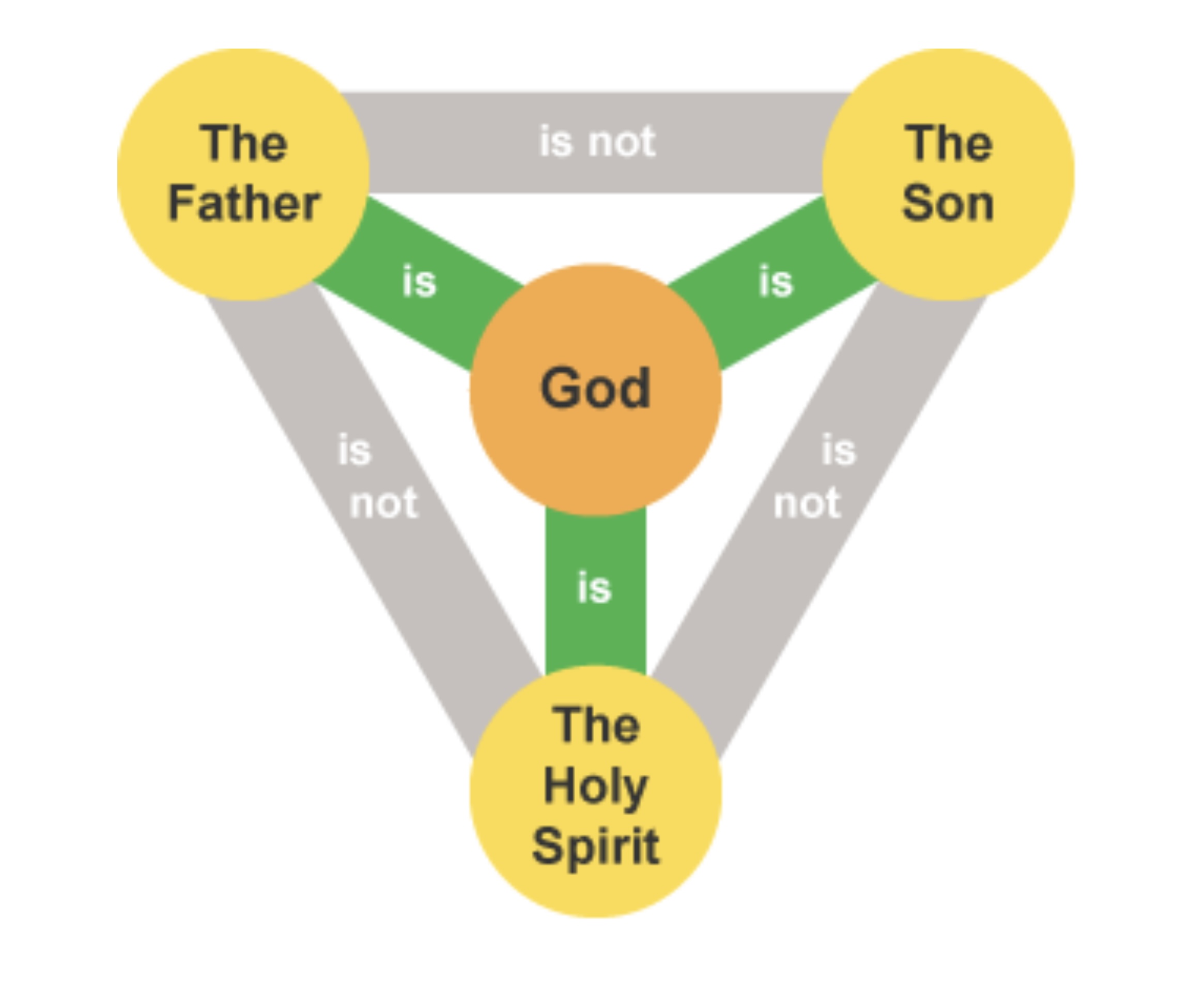
But honestly, what does this diagram mean? It doesn't honour the Lord God. Neither does it explain the meaning of the Trinity. It does, however, speak volumes about the perpetrators of this kind of 'knowledge'.
Which prompts the question, “Does this 'knowledge' mean that God is some sort of ghost, who can separate and recombine at will? Or perhaps God is some sort of exploding/recombining pie having three slices?
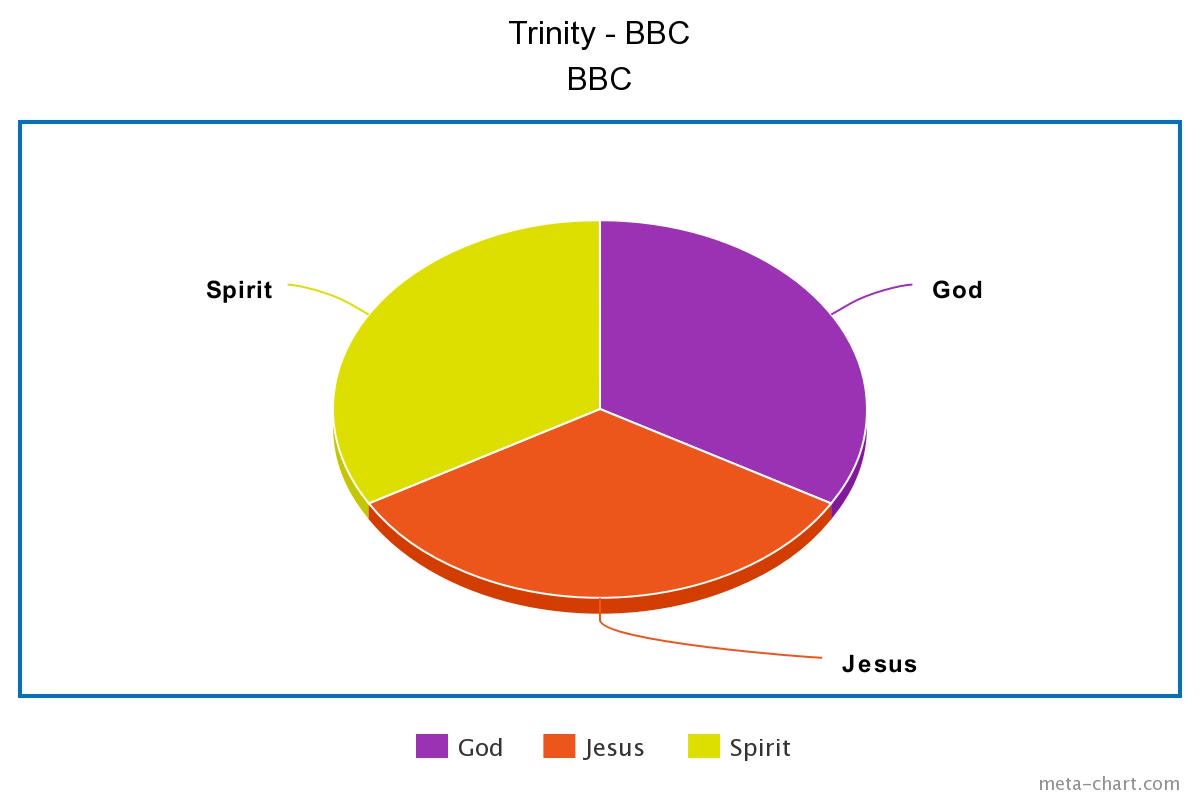
Drivel of this kind dishonours the Lord God. Yet it typifies the stupidity which has characterised the new-covenant church down through the centuries. It would be more honest to say, "I don't understand the Trinity," for this would at least encourage discussion and give the Lord something to work with. However, such an admission of ignorance would do nothing to further the retention of the church's fading vestiges of 'command and control'. The new-covenant church have lost the power of life or death over people in society. And the church is rapidly becoming an irrelevance in society.
Jesus denies any connection with ghosts, killing that notion stone-dead:
36 While they were talking about this, Jesus himself stood among them and said to them, "Peace be with you." 37 They were startled and terrified, and thought that they were seeing a ghost. 38 He said to them, "Why are you frightened, and why do doubts arise in your hearts? 39 Look at my hands and my feet; see that it is I myself. Touch me and see; for a ghost does not have flesh and bones as you see that I have." 40 And when he had said this, he showed them his hands and his feet. 41 While in their joy they were disbelieving and still wondering, he said to them, "Have you anything here to eat?" 42 They gave him a piece of broiled fish, 43 and he took it and ate in their presence. (Luke 24:36-43 NRSV)
The Trinity comprises three separate individuals, each having their own identity.
So, what relationships exist between the members of the Trinity?
There is a hierarchy, an order of precedence:
And this is confirmed by the dependencies within the Trinity:
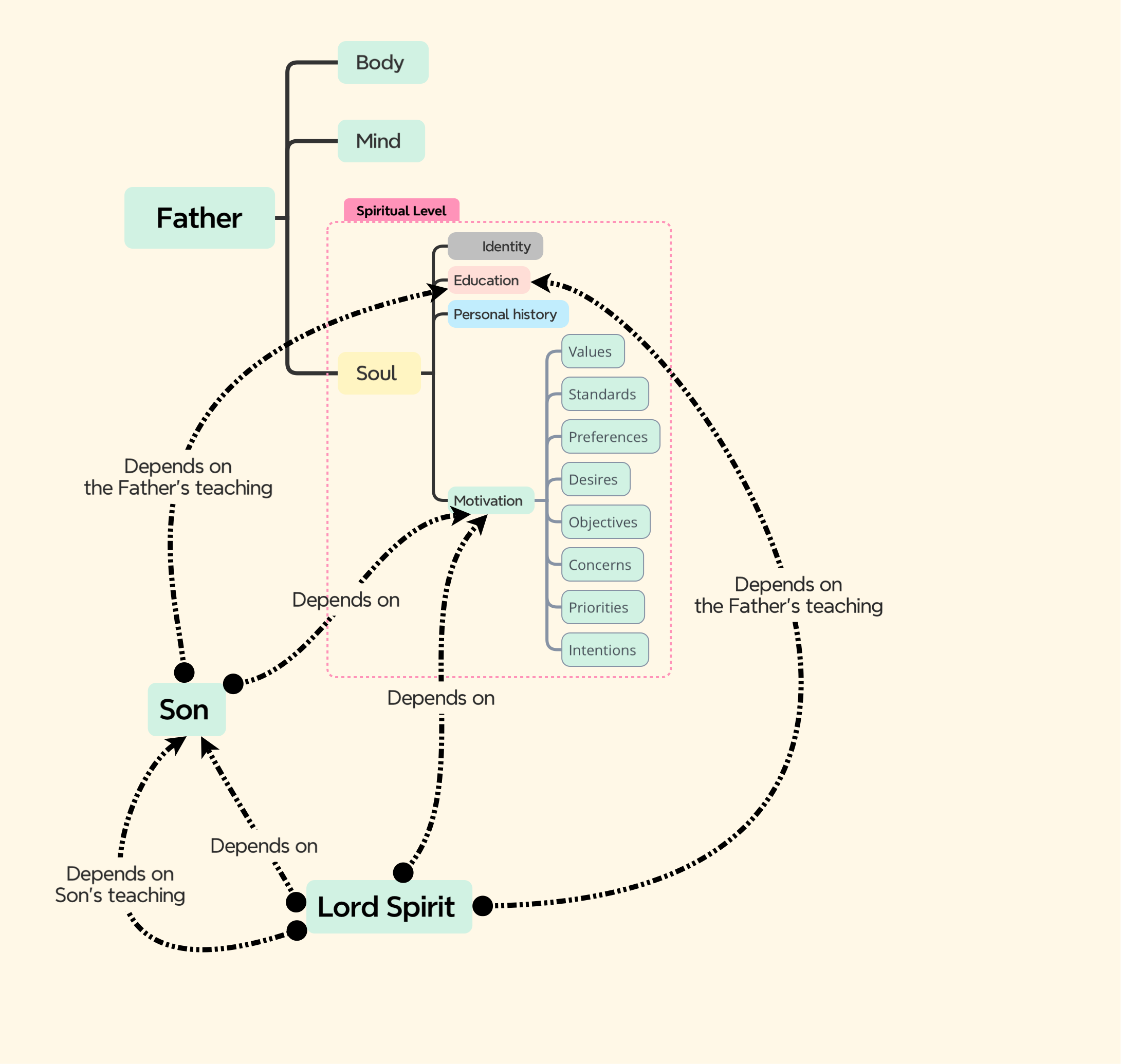
Trinity dependencies
Jesus sets self aside! He chooses to depend on his Father's knowledge and understanding; He therefore seeks to learn from his Father. Jesus hands the direction of his life over to his Father; and this choice is confirmed by His obedience to his Father.
The Book of Revelation confirms Jesus' existential existence within the Heavenly Realm:
[6] Then I saw a Lamb, looking as if it had been slain, standing at the center of the throne, encircled by the four living creatures and the elders. The Lamb had seven horns and seven eyes, which are the seven spirits of God sent out into all the earth. (Revelation 5:6 NIV)
Elsewhere, Jesus outlines the dependencies quite simply. He explains His own dependency on his Father:
49 "For I did not speak of my own accord, but the Father who sent me commanded me what to say and how to say it. 50 I know that his command leads to eternal life. So whatever I say is just what the Father has told me to say" (John 12:49-50 NIV).
And He explains the dependencies of the Lord Spirit:
12 "I have much more to say to you, more than you can now bear. 13 But when he, the Spirit of truth, comes, he will guide you into all truth. He will not speak on his own; he will speak only what he hears, and he will tell you what is yet to come. 14 He will bring glory to me by taking from what is mine and making it known to you. 15 All that belongs to the Father is mine. That is why I said the Spirit will take from what is mine and make it known to you.” (John 16:12-15 NIV)
26 "But the Counselor, the Holy Spirit, whom the Father will send in my name, will teach you all things and will remind you of everything I have said to you" (John 14:26 NIV).
13 "But when he, the Spirit of truth, comes, he will guide you into all truth. He will not speak on his own; he will speak only what he hears, and he will tell you what is yet to come" (John 16:13 NIV).
Let's expand the above schematic by introducing a mind-map of the dependencies in the Trinity. Here are the desires and choices of Son and Lord Spirit:
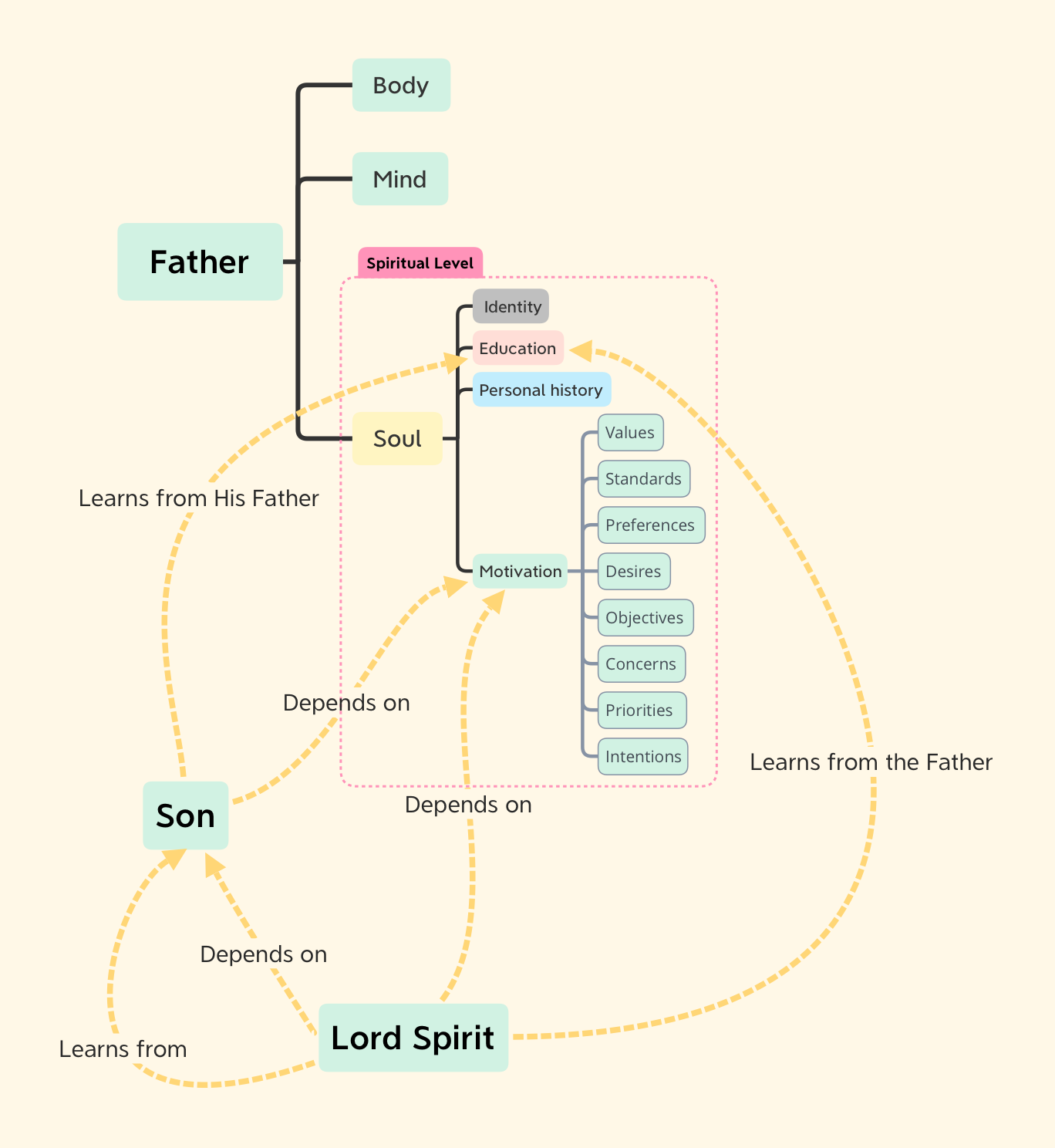
Son and Spirit choose to hand over the direction of their lives.
The Son hands the direction of His life to His Father. The Lord Spirit hands the direction of His life over to the Father and the Son. Those dependencies are the choices freely made by the Son and the Lord Spirit. Having heard God's offer of the Primary Contract, the Son chose to accept His Father's teaching and to depend on and obey His Father. Equally, the Lord Spirit chose to learn from both Father and Son, and to obey them.
[Essay: The Trinity Contract is a component of the Covenant.]
Paul defiles the Covenant: he insists on saying that it isn't based on faith, but on the works of the law [as written down by Moses in the Book of Teaching]:
[15] “We who are Jews by birth and not sinful Gentiles [16] know that a person is not justified by the works of the law, but by faith in Jesus Christ. So we, too, have put our faith in Christ Jesus that we may be justified by faith in Christ and not by the works of the law, because by the works of the law no one will be justified." (Galatians 2:15-16 NIV)
[Essay: Paul, the Covenant, and moralism - as exemplified by Galatians 2:15-16.]
Yet it is the faith of the dependents - Jesus and Lord Spirit - which enables them to accept the teaching of those on whom they choose to depend. This faith, in turn, enables them: to give up the direction of their own lives; to accept the teaching and direction of those on whom they depend; to espouse the values, standards, and desires of those on whom they depend, making them their own; and to obey the wishes of those on whom they depend.
[Essay: Acceptance of and obedience to the [current] Covenant entails 'faith'.]
With the Lord God's acceptance of the desires and choices and obedience of Jesus and the Lord Spirit, He is then able to commit to teaching both the Son and the Spirit, thereby obtaining their obedience. Thus:
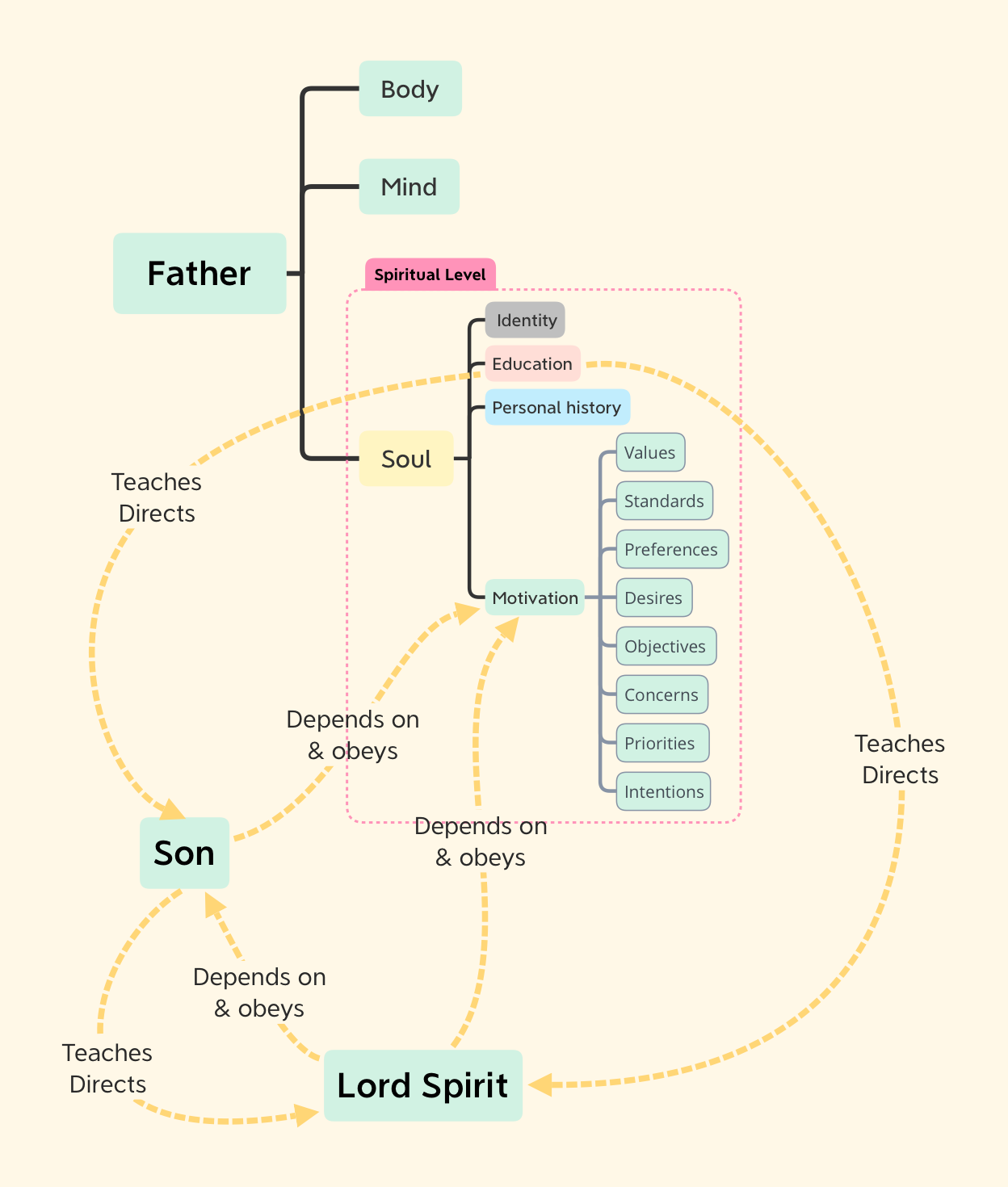
Trinity dependencies
It is important to be able to recognise a contract staring one in the face. And here, in this last schematic, Trinity dependencies, may be seen the elements of [contractual] 'consideration'. The Son hands the direction of His life over to the Father; the Father, in turn, teaches and directs His Son. The Lord Spirit hands the direction of His life over to the Father and the Son who, in turn, teach and direct the Lord Spirit. To summarise the consideration:

Trinity - consideration
It is clear that, in the Heavenly Realm, Father, Son, and the Lord Spirit are signatories to the Prime Axioms and Primary Contract of the Trinity Contract. In like manner, when Jesus reached the Age of Discretion on Earth, He signed up to the Covenant. Because the Son is completely obedient to the Father, the Lord Spirit is able to place Himself at Jesus' disposal.
The complete unity of Father, Son, and Spirit, leads to massive effectiveness through potentiation.‡.
[‡ For an instance of potentiation used for evil purposes, see Genesis 11:1-9 Tanakh.]

So what did Jesus mean when He said,
“I and the Father are one." (John 10:30 NIV)
When Jesus says that He and His Father are 'one', he does not mean that they are one person at the Physical Level! They are separate individuals at the Physical Level. It is only at the Spiritual Level that their unity can be seen. The dependencies within the Trinity - as may be seen from the diagram above - have their origin with God's soul. For it is the soul which contains God's values, standards, intentions, and so on...
In the Heavenly Realm, the Father's values, standards, desires, and intentions exist at the Spiritual Level as part of His Soul† (specifically 'motivation'). Both the Son and the Spirit have relinquished their own sense of values: Jesus has made Himself dependent on His Father's motivation; while the Lord Spirit has chosen direct dependence on the Father's motivation and also on Jesus Himself (who, in turn, directly depends on His Father's motivation).
[† Lest the fact of God's Soul is in doubt, then King David10C makes mention of it in the Psalms:
5 The Lord examines the righteous, but the wicked and those who love violence his soul hates. (Psalm 11:5 NIV)]
[See The Soul]
Hence, whenever the Son or Spirit interact with mankind, their speech and actions do not originate from their own minds, but instead have their origins with the Father. Of course, the members of the Trinity are at liberty to discuss matters freely amongst themselves within the framework of the Trinity Covenant.
Likewise, when the members of the Covenant are teaching or evangelising, then they too must pass on only that which originates from the Father. This is one reason why all compromised content within the Bible needs to be deleted, for only then will the truth and reliability of Scripture be re-established and assured.

The relationships between the Trinity teach us an important lesson: the denial of our own desires, together with complete obedience to the Father's desires.
Jesus didn't go into the underlying theory - though He could have done! Jesus leads His flock, and so becomes the example for us to follow:
[23] Then he [Jesus] said to them all [His disciples]: "If anyone would come after me, he must deny himself and take up his cross daily and follow me. (Luke 9:23 NIV)
On the Mount of Olives, Jesus prayed:
[42] "Father, if you are willing, take this cup from me; yet not my will, but yours be done." (Luke 22:42 NIV)
The point worth noting is that Jesus applies in His Earthly life the exact same thing He undertook in the Heavenly Realm as part of the Trinity. And so, in Luke 22:42, Jesus admits that His own preference is to avoid Calvary; nevertheless, He sets aside His own wishes, choosing to obey His Father's wishes in the matter. This, then, is the meaning of Luke 9:23:
Paul's use of the Lord Spirit as a trump card is an example to be avoided! The dangers are all too apparent. Get it wrong, as does Paul on occassion, and one will be Blacklisted for dissing the Lord Spirit. One can fall foul of the Lord Spirit either by:
One finds oneself between a rock and a hard place, for who is so infallible that they can say that they never get it wrong?
So, what is the best course through the minefield?
Thankfully, the Book of Teaching comes to the rescue!
Jesus states:
[31] For this reason I tell you: people can be forgiven any sin and any evil thing they say; but whoever says evil things against the Holy Spirit will not be forgiven. [32] Anyone who says something against the Son of Man can be forgiven; but whoever says something against the Holy Spirit will not be forgiven - now or ever. (Matthew 12:31-32 GNT)
The possibilities:
So what, if anything, can be done in order to avoid being blacklisted? Check out the Trinity dependencies again:
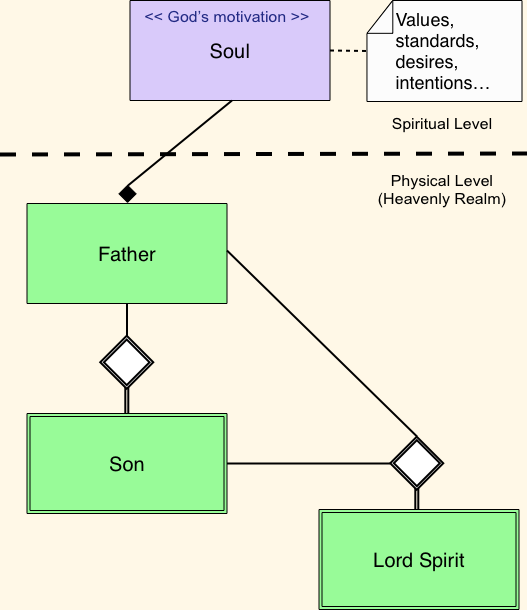
Trinity dependencies
Notice how everything which is said or done proceeds from the soul of the Father. The Son is totally dependent on the Father. The Lord Spirit, on the other hand, is dependent on the Father and the Son.
Hence, it is possible to avoid citing the Lord Spirit directly, and instead cite the Father. The Lord Spirit is unable to defend Himself; the Father therefore put in place the protection mentioned by Jesus (Matthew 12:31-32). The Father, on the other hand, is well-able to defend Himself against those who dishonour Him.
Of course, if one is certain, then it is possible to cite Jesus or the Lord Spirit directly.
If the Lord Himself states that the Lord Spirit has been at work - as is the case with David† - then the intervention of the Lord Spirit is confirmed and His actions are therefore trustworthy.
† [43] He [Jesus] said to them, "How is it then that David by the Spirit calls him Lord, saying, (Matthew 22:43 NRSV)
Version: 2024-12-15